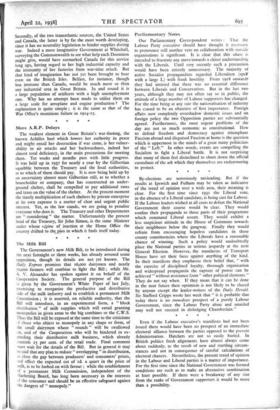By-elections are notoriously misleading. But if the results at Ipswich
and Fulham may be taken as indicative of the trend of opinion over a wide area, their meaning is clear. For the first time since 1931 the Liberal vote, in the absence of a Liberal candidate, is being cast for Labour. If the Labour leaders wished at all costs to defeat the National Government their course would be clear. They would confine their propaganda to those parts of their programme which command Liberal assent. They would exhibit a less suspicious attitude in the House of Commons towards their neighbours below the gangway. Finally they would refrain from encouraging hopeless candidates in those county constituencies where the Liberals have a reasonable chance of winning. Such a policy would undoubtedly place the National parties in serious jeopardy at the next General Election. However, the mandarins of Transport House have set their faces against anything of the kind. In their manifesto they emphasise their belief that, " with the exercise of disciplined loyalty, thorough organisation and widespread propaganda the capture of power can be achieved " without assistance from " other political elements." They do not say when. If they mean that it can be done in the near future their optimism is not likely to be shared by anyone except the leader-writers of the Daily Herald. Sir Stafford Cripps wrote last week that " it is probable that today there is no immediate prospect of a purely Labour Government, since the Labour Party alone and unaided may well not succeed in dislodging Chamberlain."










































 Previous page
Previous page